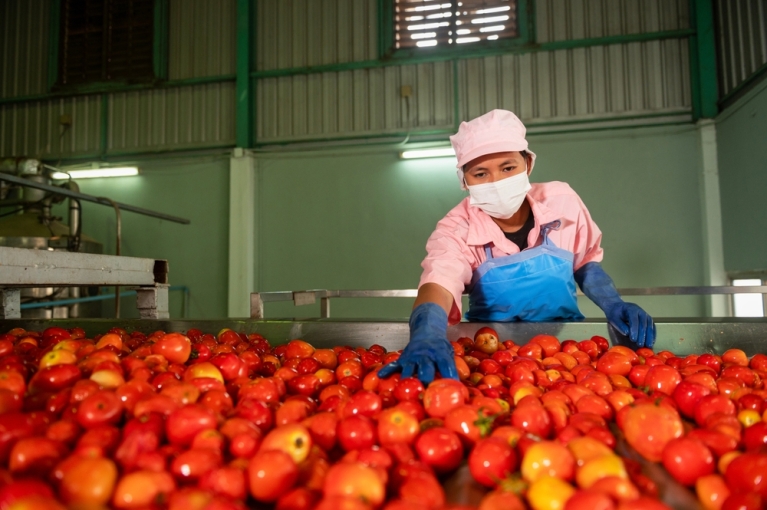
These principles apply to all businesses in their own operations and through their supply chain relationships.1
Businesses can affect the risk of GBVH both through action and inaction. They influence respect for human rights, including those of workers, contract workers, workers in their supply chain, communities where they operate, and those using or affected by their services (e.g. security, warehousing).
The principles are intended to encourage collaboration and recognition of shared responsibility between supply chain actors,2 including buyers, suppliers, and producers, without disproportionally transferring risks and costs to partners.
The principles can serve as a basis for collaboration between business and civil society, especially trade unions and, when relevant, external stakeholders such as NGOs, gender experts and other civil society actors. The principles can help initiate and structure dialogue about working conditions, prioritise action and identify where civil society can support. Trade unions and NGOs can support in identifying and understanding risks, engaging effectively with workers and other rightsholders (e.g. community members) and co-designing and implementing effective solutions.
Scope of the principles
The principles do not prescribe a fixed list of activities for supply chain stakeholders, as appropriate actions are context specific and influenced by business size and supply chains complexity. Instead, they provide a framework for addressing the root causes and consequences of GBVH in the workplace.
In line with the UNGPs and OECD Guidelines,3 business responsibilities depend on whether they cause or contribute to GBVH through their actions or omissions or are linked via business relationships.
Key activities of concern are:
- Employing workers - which includes recruitment, hiring, and substantial control of working conditions (hours, pay, health and safety), labour management (discipline, supervision, direction), for both contract and indirect workers producing4 goods (e.g. agricultural products) and services.
- Purchasing goods (e.g. placing orders) that are produced by workers, including those not for re-sale.
- Purchasing services that are performed by workers or delivered on behalf of businesses such as cleaning, security, logistics and warehousing.
All businesses have a responsibility to conduct GRHRDD to assess and address the impact of their activities on the human rights of workers and other stakeholders across the supply chain, including customers, the general public, and local communities where businesses operate. As part of the responsibility of businesses to respect human rights, they must also provide safe workplaces.
Businesses are encouraged to prioritise action where risks to human rights are greatest and where they can effect change and mitigate harm — GBVH being a critical example. These principles therefore apply to both to businesses’ own operations and across supply chains.
As businesses are most likely to cause GBVH in their own operations, this should be a priority area for action, given their ability to bring about change by directly ceasing harmful practices or introducing mitigation.
Where the most adverse impacts on human rights with respect to GBVH arise outside their own operations, businesses are likely to fall on a spectrum between direct linkage and contribution. In such cases, their actions should focus on due diligence consistent with UNGP 195 and are likely to relate to:
- ensuring coherence and alignment of business activities (e.g. purchasing, contracting and responsible sourcing),
- ensuring expectations for safe working conditions free of GBVH are clear and understood by business partners,
- sharing responsibility with business partners through joint risk assessment, mitigation and remediation actions as per these principles,
and finally tracking progress and embedding learning to better prevent GBVH.
